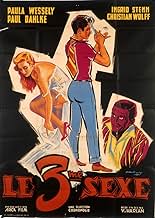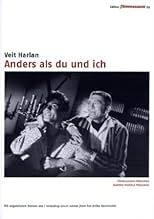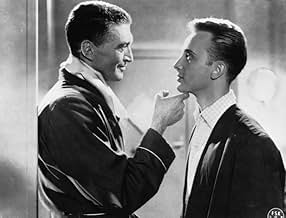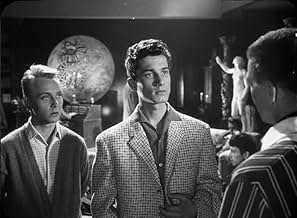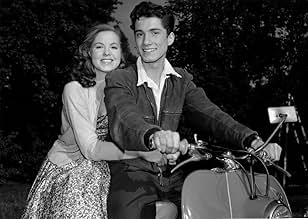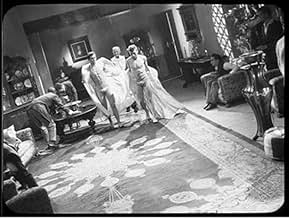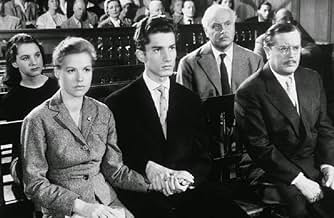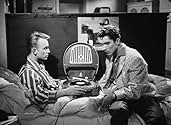Adicionar um enredo no seu idiomaKlaus is a young man in post-war Berlin. He is drawn to his friend Manfred and, under the encouragement of their acquaintance, Dr. Winkler, explore the underground world of gay clubs and ele... Ler tudoKlaus is a young man in post-war Berlin. He is drawn to his friend Manfred and, under the encouragement of their acquaintance, Dr. Winkler, explore the underground world of gay clubs and electronic music. His family begins to learn of his other life and do everything they can to ... Ler tudoKlaus is a young man in post-war Berlin. He is drawn to his friend Manfred and, under the encouragement of their acquaintance, Dr. Winkler, explore the underground world of gay clubs and electronic music. His family begins to learn of his other life and do everything they can to set him straight.
- Manfred Glatz
- (as Günther Theil)
- Travestiekünstler
- (as Marcel Andrée)
- Butler Maurice
- (não creditado)
- Petra Mertens
- (não creditado)
- Direção
- Roteiristas
- Elenco e equipe completos
- Produção, bilheteria e muito mais no IMDbPro
Avaliações em destaque
Fortunately the Filmmuseum München (Munich Film Museum) has undertaken the effort to find footage from the original version of the movie, called "Das dritte Geschlecht" ("The 3rd Sex"), and has just released a DVD of "Anders als du und ich" (European PAL, region code 0, German soundtrack with optional English subtitles) which provides the movie not only in stunning technical quality but also with extensive extra features including comparisons of all edited scenes with their original version. And these original scenes are far from homophobic! To give you just one example, in the edited version the lyricist's mother tells the painter's uncle (who joins the father in searching for his son) that she knows her son is gay and that she has learned to accept it, and the man replies that she mustn't accept it. In the original version he simply replies: Well, that's fate. A multitude of more examples prove without doubt that the original intention of the film was remarkably enlightened, and the superb and highly recommended DVD edition even contains a ROM part with documents that explain why the alterations were performed: The "Freiwillige Selbstkontrolle", a German film rating organization comparable to the MPAA, rejected the original version - for "advertising" homosexuality!
To get that straight (sorry for the pun): All this doesn't make Mr Harlan a saint. There are elements in the film that are hard to explain: Why is the art dealer filmed in a sort of demonic light during his all-male soirées? Maybe to parody the society's view on homosexuality? If so this would be a risky approach.
In the end we cannot accuse Mr Harlan of homophobia but certainly of naiveté: He, who always claimed that Goebbels (Hitler's "secretary of propaganda") had not only forced him to shoot "Jud Süß" but also destroyed his own non-antisemitic cut of the film (there are at least clues to support his version of the story) should have been warned that something similar could happen again and that this in conjunction with his reputation would destroy any noble message he may have wanted to communicate.
All in all a highly interesting and truly unique historical document of the situation of homosexuals in Germany very far "before Stonewall".
Former UFA director Harlan was cleared of war crimes in 1948, claiming he was only following orders and that Goebbels tampered with his JUD SUSS but judging by what the censors did to DIFFERENT FROM YOU AND ME (an implicitly prejudiced title changed from the original THE THIRD SEX) there might be some truth to that.
By 1962 when I was about 11 years old, "The Third Sex" was still in the local cinema circuit. I never saw the movie, and I did not even try in adolescence. By then I was more curious about Isabel Sarli's mega-bosom and her adventures in waterfalls and beaches, until the British Protestant boys appeared and seduced us all, with the Beatles and Malcolm McDowell leading hordes of rebels. Nevertheless, the influence of "The Third Sex" lasted everywhere.
The film was made as an argument against the 175 article, which criminalized homosexual acts, even in the privacy and with the consent of the adults involved. However it was mainly used to alert (straight) adults of the "dangers of homosexuality and its vectors", and to give parents, grandparents, great-grandparents and teachers basic instructions on how to "cure" the children of "the plague".
The leading characters are people that "moral majorities" always seem to follow and respect. Members of the petty bourgeoisie, social "wannabes" between being or not being, between having or not having, who go to mass but curse as soon as they exit the church, etcetera... you know them well. The film tells how a "decent" family mother (with the looks of not having sex in more than a decade, judging by the boredom inspired by her banker husband) "saves" her son from the grip of "homosexualism", inducing him to have sex with the maid.
The young man seems quite normal to me, a painter in the making, willing to live "la vida loca", but naïve enough to hang around with men who are either impertinent, foolish and corny, or depraved and corrupt. The wholesome proletarian girl serving the family is the perfect potion, according to mother, a practice that is still common in many homes, behind closed doors. Momma the Witch Doctor goes to trial accused of procuring and before a sentence is pronounced, we watch her story in flashback.
Despite being a piece that did not pass the test of time, «Different from You and Me» is fascinating to see, as not to forget how cruel we humans can be. In short, if we persist on reading only bibles and (disguised) Nazi manifestos to learn about our human essence, we will continue to live on this planet of the apes.
Você sabia?
- CuriosidadesWas censored, cut and initially banned upon it's release for tackling, what was considered to be a controversial subject of (then criminalized) homosexuality.
- Versões alternativasGerman edit is heavily censored; US cut, although shortened, more like the original, director's cut.
Principais escolhas
Detalhes
- Tempo de duração
- 1 h 31 min(91 min)
- Cor
- Proporção
- 1.37 : 1

